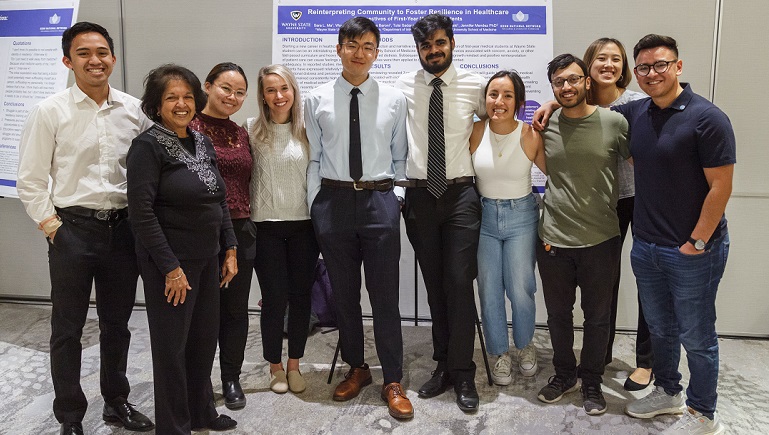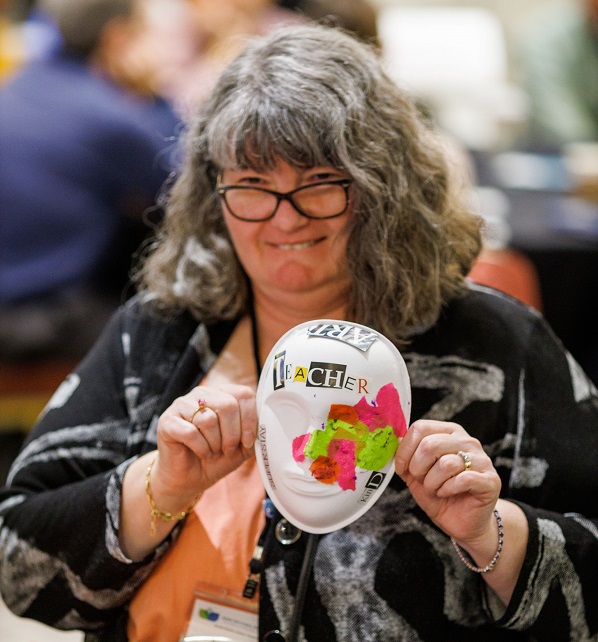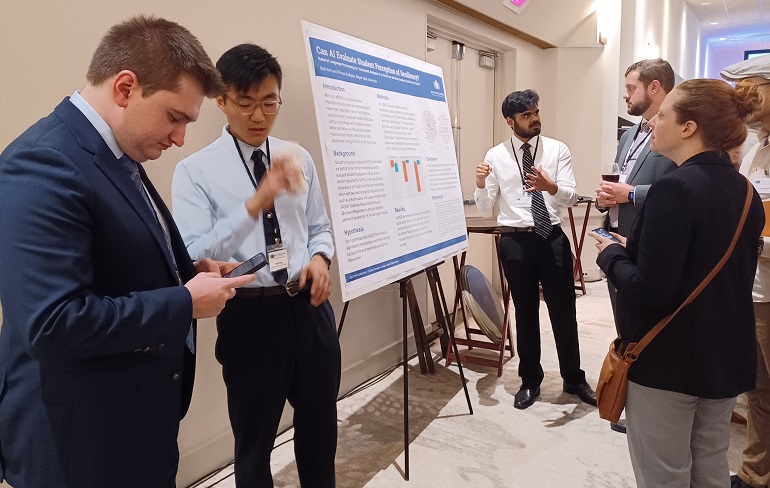
Medical students and faculty recently traveled to Wisconsin to represent the Wayne State University School of Medicine at the first in-person conference on a national movement in medical education that focuses on integrating caring, character and practical wisdom in the profession of medicine.
The WSU School of Medicine team presented several Wayne State-led projects reflecting these ideas at the Kern National Network for Caring and Character in Medicine conference, held Sept. 29-30 in Milwaukee.
The Kern National Network, or KNN, encompasses seven founding medical schools dedicated to transforming medical and health professions education using the concepts of caring and character, working with health care organizations to influence cultures and environments, and sharing knowledge and engaging partners toward broader policy and systems change.
Justin Padron, a member of the Class of 2025, attended the conference.
“I learned that every individual has their own unique life experiences and journeys in medicine. The coalescing of our own perspectives and experiences can help improve both medical care and medical education,” he said.
Padron, along with classmates Kathleen Young and Sabrina Montemayor, led the roundtable discussion on “Uncovering the Uncomfortable for Medical Students: Presented in Storyboard." The presentation was created by a six-person team to share information regarding how students transitioned into a mindset of growth, becoming comfortable with what feels uncomfortable in a new environment such as medical school. The discussion spotlighted specific issues relevant to medical school that each member initially faced, and the strategies employed to overcome them.
“The roundtable presentation was an informal discussion with other medical students and current residents,” Padron said. “It was surprising that in our discussion the growth mindset was a fairly new concept to the older residents, although a very familiar one to younger residents and current medical students. Our feedback was more of a casual conversation and a sharing of experiences that each individual has had in their journey as a future or current physician.”

Anuj Kavi, Adrienne-Denise Bilbao, Rachel Puentes and Alexander Buendia presented “Resiliency Storyboard: We All Just Want to be Some M&MDs.” The goal of the roundtable was to showcase the prevalence of imposter syndrome among young professionals, pinpoint areas of mistruth, and provide awareness to combat stigmatization.
The story boards were part of the Class of 2025's first month of medical school in 2021.
Sara Ma and Kavi presented “Augmenting Medical Education with Healthcare Consulting,” which focused on the Innovation and Consulting Group at the School of Medicine. The newly created, student-driven initiative is intended to bridge the gap between medical knowledge and health care operations. The roundtable focused on how health care volunteer consulting projects can augment traditional medical education by providing students with unique opportunities to co-opt scientific methodologies to support the growth or optimization of local health care businesses and clinics.
School of Medicine Associate Professor Emeritus Jennifer Mendez, Ph.D.; Wayne State Art Collection Curator Grace Serra, M.A.; Eugene Applebaum College of Pharmacy and Health Sciences Adjunct Assistant Professor and Co-Director of Service Learning Rima Charara, Pharm.D.; and university counselor Jennifer Crystal, Ph.D., created “Reflective Expression of Values and Professional Identity Formation Found in Mask Making.” During the roundtable, Dr. Mendez shared the development of the service-learning project launched in August 2022 with the Class of 2026. They also shared examples of masks created to illustrate professional identity formation through growth mindset.
Elizabeth Ellinas, M.D., M.H.P.E.; Liz Petty, M.D.; Brittanie Hazzard Bigby, M.D.; Anne Stahr, M.S.; Dr. Mendez; and LuAnn Wilkerson, Ed.D., also created “Flourishing in Women Leaders.” Through the Women Leaders Flourishing Panel, the KNN Women's Leadership Group, in partnership with the Medical College of Wisconsin Center for the Advancement of Women in Science and Medicine, explored the concept of life flourishing with women leaders, particularly the relationship between flourishing and leadership opportunities.
In addition to the roundtable presentations and discussions, students and faculty presented the posters “Reinterpreting Community to Foster Resilience in Health Care” by Sara Ma, Wouter Ritsema, Nicholas Baron, Tulsi Sadasivan, Lara Zaril, Jad Baki and Dr. Mendez, and “Can AI Evaluate Student Perceptions of Resiliency?” by Class of 2025 students Matt Kim and Dhruva Kadiyala. The latter poster summarized a project called VADER, or Valence Aware Dictionary for Sentiment Reasoning, an idea initiated by Kim.

“With courses such as service learning, which deals with concepts like growth mindset and professional development, it is often hard to assess the success rate of a course based on tangible metrics as there no exams that one can take to demonstrate in short term,” Kim said. “Hence, the assessment then has to rely on students’ reflections before and after going through the class and surveys administered at the end of the course. For a course director to parse through the projects from all teams to assess the shift in sentiment is hard and time consuming, and the surveys can have many confounds, such as leading questions and many choosing socially acceptable responses.”
VADER was developed for assessing the polarity of sentiments in large social media platforms and their intensity.
“Since we wanted to see if there was indeed a benefit of doing the project, we employed VADER to see if there was shift in how students think about various obstacles as a first-year using the story boards and their reflections. We hope, when refined, technologies like VADER can supplement the tools we currently have to cut down on analysis time while offering a tangible score to see if the course achieved what the directors meant it to achieve,” Kim added.
Kadiyala said several medical students from other institutions asked about the workings of the software to implement something similar in their own projects. “This conference assured us that there is substantial potential for progress when health care, education, and technology intersect,” she said.
Each presentation came from Service Learning Professional Identity Formation projects.